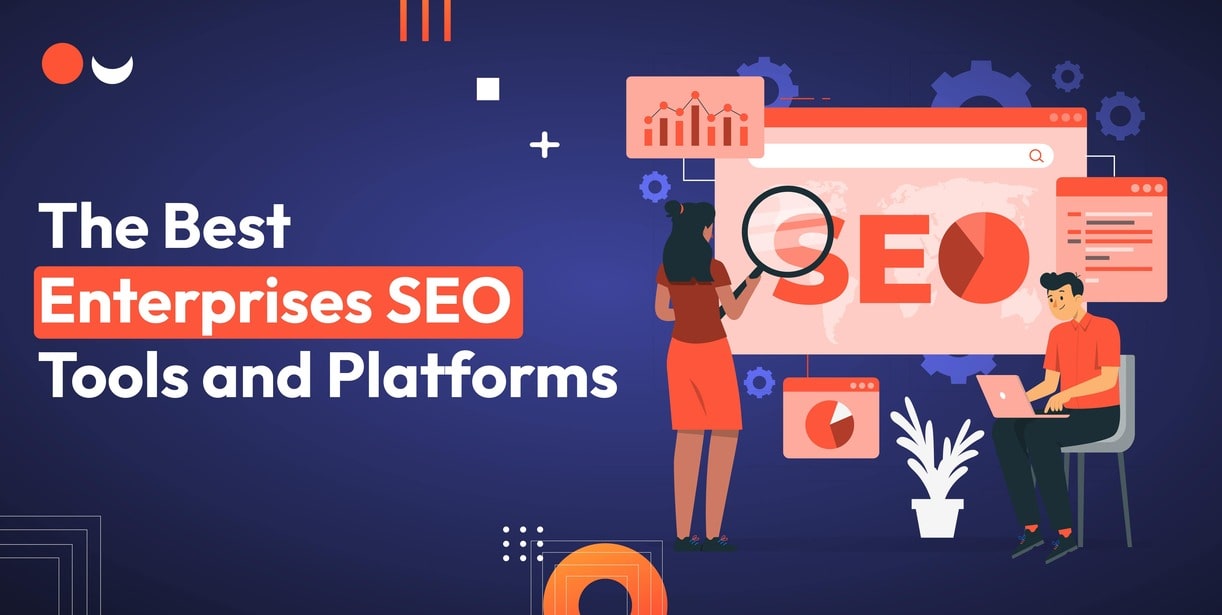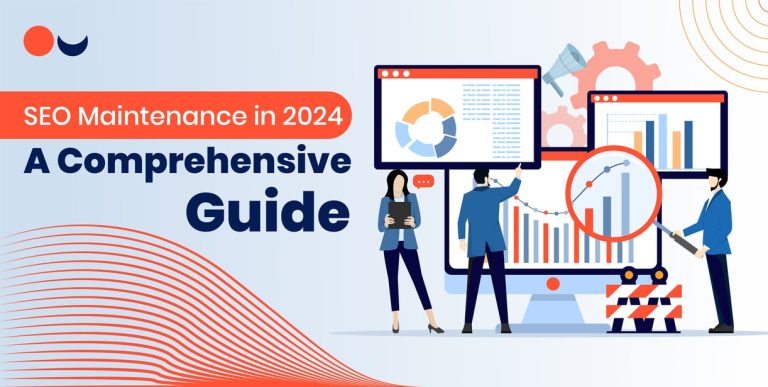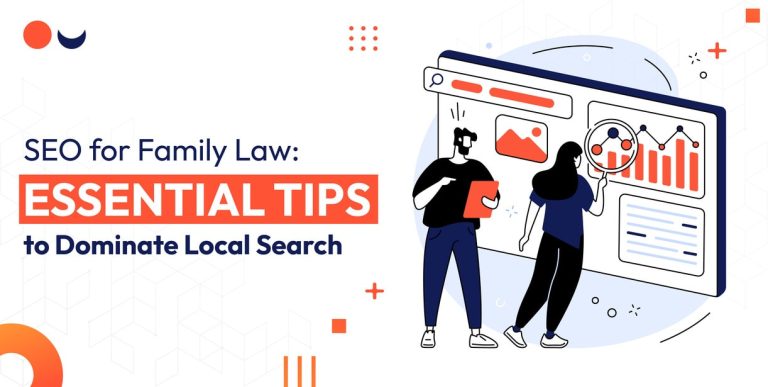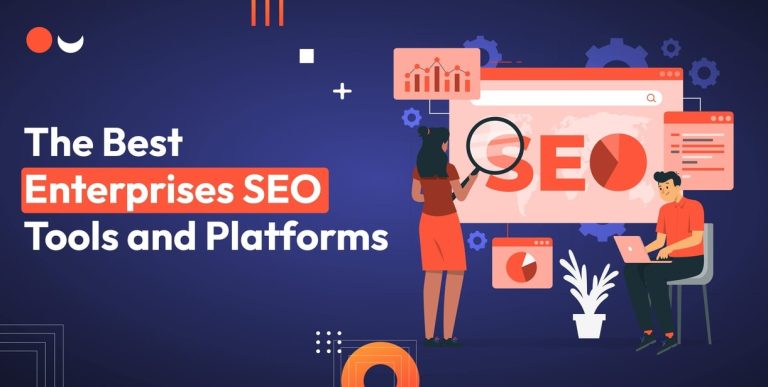Having a strong online presence is crucial for businesses to succeed. Search Engine Optimization (SEO) plays a key role in this by helping companies appear higher in the Google search console, attract more visitors naturally, and boost sales.
For larger companies, just knowing the basics of SEO isn’t enough. They need advanced tools and platforms that can handle their complex needs, like managing big websites, reaching diverse audiences, and competing in tough markets.
When scaling your enterprise SEO efforts, a mix of small toolsets can become a challenge. You want to maintain the growth of your organic presence. You need a platform to support large-scale needs. Enterprise SEO tools are designed specifically for these challenges. They offer features such as detailed data analysis, thorough research on popular keywords, studying competitors closely, and checking websites for technical issues. These tools help businesses improve how they’re seen online, make their websites more user-friendly, and keep up with changes in how search engines rank pages.
Tools like Ahrefs and Semrush are well-known for analyzing links and improving keyword use. Others, like Majestic, specialize in understanding links deeply. Each tool has its strengths, helping businesses grow steadily and stand out online. Choosing the best enterprise SEO tool is crucial for businesses aiming to thrive in today’s competitive digital world.
What is Enterprise SEO Tools
Enterprise SEO Tools are specialized software solutions designed to cater to the unique needs of large-scale businesses. Unlike standard SEO tools, which are often suitable for small to medium-sized enterprises (SMEs), enterprise-level tools offer advanced features tailored for managing extensive websites, large volumes of data, and complex SEO strategies.
Key Features of Enterprise SEO Tools
- Scalability: Enterprise SEO platforms like Ahrefs excel in handling vast amounts of data and managing multiple websites or domains seamlessly.
- Customization: Tools such as SE Ranking provide tailored dashboards, reports, and workflows that meet specific enterprise-level SEO campaign needs.
- Collaboration: Support for multi-user access and permissions management is crucial, integrated with other business systems like CRM and analytics platforms.
- Automation: Advanced automation capabilities offered by tools like Semrush streamline site audits, keyword tracking, and content optimization.
If you want SEO to work well for your online plans, think about getting big-business SEO software. It makes your work easier and keeps you ahead of others.
Why is Enterprise SEO Important in SEO Strategy?
Enterprise SEO (Search Engine Optimization) is important for large organizations and enterprise businesses due to several key reasons:
Visibility and Traffic
Increased Organic Traffic: Effective enterprise SEO strategy helps businesses rank higher in search engine results pages (SERPs) for relevant keywords. This visibility attracts more organic traffic to the website, which is often more cost-effective than relying solely on paid advertising.
Brand Authority and Trust
Enhanced Brand Visibility: Ranking well in search results enhances brand credibility and authority. Users tend to trust websites that appear at the top of search engines, leading to higher click-through rates (CTR) and conversions.
Long-Term Investment: SEO builds a solid foundation for long-term online visibility and brand equity. Unlike paid advertising, which stops generating traffic once the budget is exhausted, SEO efforts can continue to drive traffic and results over time with consistent optimization. Enterprise SEO tools help include these phrases in your content or create optimized pages for better search visibility.
Competitive Edge
Outperform Competitors: Enterprises operate in competitive markets where every advantage counts. Effective SEO can help businesses outperform competitors by capturing more market share and attracting potential customers searching for products or services.
Cost Efficiency
ROI and Cost-Effectiveness: While enterprise SEO requires an initial investment in tools, resources, and expertise, it typically offers a higher return on investment (ROI) compared to other marketing channels. Once established, organic traffic from SEO efforts continues to generate leads and sales at minimal ongoing costs.
User Experience and Engagement
Optimized User Experience: SEO involves optimizing enterprise websites for user experience, which includes faster loading times, mobile-friendliness, intuitive navigation, and valuable content. These factors not only improve rankings but also enhance user engagement and satisfaction.
Insights and Data-Driven Decisions
Actionable Insights: SEO tools provide valuable data and insights into user behavior, keyword trends, and competitor strategies. This data enables enterprises to make informed decisions, refine marketing strategies, and adapt to changes in consumer behavior and search engine algorithms.
Integration with Marketing Strategies
Holistic Marketing Approach: Enterprise SEO integrates with other digital marketing strategies such as content marketing, social media marketing, and PPC advertising. A cohesive approach ensures consistent messaging across channels and maximizes overall marketing effectiveness.
Scalability and Adaptability
Scalable Solutions: Enterprise SEO tools and strategies are designed to handle large-scale operations, multiple websites, and diverse markets. They can adapt to evolving business needs, market trends, and algorithm updates to maintain and improve search engine rankings.
Local and Global Reach
Local SEO Optimization: For enterprises with physical locations, SEO helps attract local customers searching for nearby products or services. Local SEO tactics such as optimizing Google My Business listings and local citations enhance visibility in local search results.
Measurable Results and Accountability
Performance Tracking: SEO efforts can be measured and tracked using key performance indicators (KPIs) such as organic traffic, keyword rankings, conversion rates, and ROI. This accountability ensures that resources are allocated effectively and results are aligned with business objectives.
Pros and Cons of Enterprises SEO Tools
Using enterprise SEO tools can significantly enhance your digital marketing efforts, but like any tool, they come with their own set of pros and cons. Let’s explore these in detail:
Pros of Enterprise SEO Tools
- Comprehensive Data Analysis: Enterprise SEO tools offer extensive data insights into keyword performance, competitor strategies, backlink profiles, and more. This data helps businesses make informed decisions to optimize their SEO strategies effectively.
- Scalability: Designed for large-scale operations, enterprise SEO tools can handle vast amounts of data, multiple domains, and complex SEO campaigns without compromising performance. They are built to scale alongside growing businesses.
- Advanced Features: These tools often include advanced features such as AI-driven recommendations, marketing automation predictive Google analytics, customizable reporting, and integrations with other marketing tools. This allows for sophisticated SEO management and optimization. Big-business SEO tools have features that help manage your tasks and bring everyone involved in your SEO work together in one place.
- Efficiency and Productivity: By automating repetitive tasks like rank tracking, site audits, and backlink analysis, enterprise SEO tools free up time for SEO professionals to focus on strategic initiatives and creative optimization efforts.
- Team Collaboration: Many enterprise SEO tools facilitate collaboration among team members and departments. They offer features for task assignment, role-based access, and sharing of reports and insights, promoting efficiency and alignment across the organization.
- Competitive Advantage: Utilizing enterprise SEO tools enables digital marketers to stay ahead of competitors by identifying trends early, benchmarking performance against industry standards, and implementing data-driven strategies to improve rankings and visibility.
Cons of Enterprise SEO Tools
- Cost: Enterprise SEO tools can be expensive, especially for smaller businesses or startups with limited budgets. The initial investment and ongoing subscription costs may be prohibitive for some organizations.
- Complexity: Due to their advanced features and capabilities, enterprise SEO tools can have a steep learning curve. Training and onboarding new team members to effectively use these tools may require time and resources.
- Overwhelming Data: While data-rich insights are a benefit, they can also overwhelm users who may struggle to interpret and prioritize the vast amount of information generated by these tools. This can lead to analysis paralysis or ineffective decision-making.
- Integration Challenges: Integrating enterprise SEO tools with existing systems and platforms (like CMS, CRM, or analytics tools) can sometimes be complex and require technical expertise. Compatibility issues may arise, impacting workflow efficiency.
- Maintenance and Updates: Enterprise SEO tools require regular updates and maintenance to ensure they remain effective and secure. Managing software updates, troubleshooting issues, and staying abreast of new features can be time-consuming.
- Dependency on Vendor: Businesses relying heavily on enterprise SEO tools may become dependent on the vendor for ongoing support, updates, and the continuity of service. Changes in vendor policies or discontinuation of a tool could disrupt operations.
Popular Enterprise Search Engines Tools
Ahrefs: Enterprise SEO Analytics Tools
Ahrefs is a powerhouse in the SEO industry and the go-to tool of many content marketers, known for its comprehensive backlink analysis, keyword research capabilities, and site audit tools. It provides valuable insights into competitors’ strategies and helps enterprises track their SEO performance with detailed analytics. Ahrefs supports link-building strategies, helping users identify link-building opportunities.
SE Ranking: Enterprise SEO Agency Software
SE Ranking offers a complete SEO platform suitable for agencies and enterprises alike. It includes features such as keyword rank tracking, competitor analysis, on-page SEO audits, and backlink monitoring. SE Ranking’s intuitive interface and customizable reports make it a preferred choice for managing large-scale SEO campaigns.
Semrush: Best Enterprise SEO Tools
Semrush is renowned for its versatility in combining SEO with digital marketing strategies. It provides tools for keyword research, competitive analysis, keyword optimization, and PPC advertising. Semrush’s extensive database and user-friendly interface make it indispensable for enterprises looking to enhance their online presence.
SeoClarity: Enterprise Search Engine Optimization Tools
SeoClarity specializes in enterprise-level SEO solutions, offering advanced features for keyword tracking, content optimization, and comprehensive SEO audits. Its AI-powered insights and scalable architecture cater specifically to the needs of large organizations aiming to achieve SEO excellence. Additionally, seoClarity offers historical data analysis with a default time range of 13 months for web analytics and 16 months for Google Analytics.
Majestic: B2B SEO Tools
Majestic is a leader in backlink analysis and domain authority metrics, making it ideal for B2B SEO strategies. It provides detailed data on link profiles, anchor texts, and competitor analysis, helping enterprises build authoritative backlink strategies.
Netpeak Spider: Enterprise SEO Tools for Managers
Netpeak Spider is a desktop-based SEO crawler designed for comprehensive website audits and technical SEO audit and analysis. It helps managers identify and fix SEO issues efficiently across large websites, ensuring optimal performance in search engine rankings. The SEO Spider tool is a website crawler you can download and install on your local computer. Additionally, the tool helps improve website navigation by identifying broken links and navigation-related problems, enhancing user experience.
Surfer SEO: Compare Enterprise SEO Platforms
Surfer SEO focuses on content optimization and on-page SEO analysis. It provides actionable insights to optimize content based on real-time data and competitor analysis, making it a valuable tool for enterprises looking to improve their content strategy. Using a Surfer SEO platform for automated quality checks in your SEO work makes sure your content is top-notch and fits your brand. This saves time compared to checking everything by hand.
Implementing Enterprise SEO Platform: Best Practices
To harness the full potential of enterprise SEO tools, consider these best practices:
- Define Clear Objectives: Establish specific SEO goals aligned with your business objectives using tools like Surfer SEO.
- Invest in Training: Ensure proficiency in tools such as Majestic through training and continuous education.
- Integration with Other Systems: Integrate SEO tools with your stack for seamless data flow and insights, using SeoClarity.
- Regular Monitoring and Reporting: Monitor SEO performance with Semrush regularly, generating detailed reports for improvement.
- Stay Updated: Adapt strategies with Netpeak Spider to changes, trends, and tool updates.
Comparison of SEO Tools
Comparing SEO tools can be instrumental in determining which platform best suits your business’s specific needs. Here’s a detailed comparison of Ahrefs, Semrush, Majestic, SE Ranking, Surfer SEO, Netpeak Spider, and SeoClarity based on key features, usability, and strengths:
Ahrefs
Key Features:
- Backlink Analysis: Ahrefs is renowned for its extensive backlink database, offering insights into competitor backlink profiles and identifying new link-building opportunities.
- Keyword Research: Provides comprehensive keyword data including search volume, difficulty, and click metrics. A good keyword research tool is key to a successful SEO strategy and for easy ranking on the search results page.
- Site Audit: Helps identify and fix technical SEO issues that could impact rankings.
- Content Explorer: Allows users to discover popular content ideas and analyze their performance.
- Rank Tracking: Monitors keyword rankings over time and provides historical data.
Strengths:
- Robust backlink analysis and link-building tools.
- Extensive keyword research capabilities with accurate search volume data.
- Intuitive user interface and ease of use.
Weaknesses:
- Higher pricing compared to some competitors.
- Limited social media analytics and integrations.
Semrush
Key Features:
- Keyword Magic Tool: Offers extensive keyword research capabilities with data on search volume, trends, and keyword difficulty.
- Competitive Analysis: Provides insights into competitors’ SEO strategies including traffic analytics, backlink profiles, and advertising strategies.
- Site Audit and On-Page SEO Checker: Identifies technical SEO issues and suggests optimizations.
- Content Marketing Toolkit: Helps plan and optimize content strategy based on SEO insights.
- PPC Keyword Tool: Assists in managing and optimizing PPC campaigns alongside SEO efforts.
Strengths:
- Comprehensive suite integrating SEO, PPC, content, and social media marketing.
- Extensive database and accurate data on organic search and paid search.
- User-friendly interface with customizable reports.
Weaknesses:
- Can be overwhelming for beginners due to the breadth of features.
- Pricing may be prohibitive for small businesses or startups.
Majestic
Key Features:
- Backlink Analysis: Offers a detailed backlink profile for any website, including historical data and link context.
- Trust Flow and Citation Flow Metrics: Measures the quality and quantity of backlinks to assess website authority.
- Campaign Comparison: Allows comparing backlink profiles and SEO metrics across multiple domains.
- Keyword Checker: Provides keyword analysis tools for SEO strategy development.
Strengths:
- Largest commercially available link intelligence database.
- Focus on backlink analysis and authority metrics.
- Strong data visualization and reporting capabilities.
Weaknesses:
- Limited in terms of other SEO functionalities beyond backlinks.
- Interface and usability may not be as modern or intuitive as competitors.
SE Ranking
Key Features:
- Keyword Rank Tracking: Monitors keyword rankings across search engines and locations.
- On-Page SEO Audit: Identifies technical SEO issues and suggests improvements.
- Backlink Monitoring: Tracks backlink profiles and allows for competitor analysis.
- Marketing Plan: Offers tools for PPC and social media advertising alongside SEO efforts.
- White Label Reporting: Customizable reports for client presentations.
Strengths:
- Affordable pricing with a comprehensive set of SEO tools.
- User-friendly interface suitable for both beginners and advanced users.
- Strong focus on local SEO capabilities.
Weaknesses:
- Limited integrations with third-party tools compared to larger platforms.
- Keyword databases may not be as extensive as some competitors.
Surfer SEO
Key Features:
- Content Editor: Analyzes top-ranking pages for targeted keywords and provides recommendations to optimize content.
- SERP Analyzer: Assesses search engine results for selected keywords and suggests improvements based on competitor data.
- Keyword Research: Provides keyword analysis tools and helps identify content opportunities.
- Audit Tool: Offers site audits to identify technical SEO issues.
Strengths:
- Focuses on on-page SEO optimization and content strategy.
- Provides actionable insights based on real-time SERP data.
- Suitable for content creators and marketers aiming to improve page rankings.
Weaknesses:
- Less emphasis on backlink analysis and off-page SEO.
- Pricing may be higher relative to competitors offering broader feature sets.
Netpeak Spider
Key Features:
- Website Audit: Identifies and prioritizes technical SEO issues affecting site performance.
- Internal PageRank Calculation: Analyzes internal link structure and distributes link equity.
- XML Sitemap Generator: Helps create and manage XML sitemaps for search engine crawling.
- Custom Reports: Generates customizable reports for technical SEO insights.
Strengths:
- Desktop-based crawler offering in-depth technical SEO analysis.
- Affordable pricing for small to medium-sized businesses.
- Useful for agencies and SEO professionals managing multiple client websites.
Weaknesses:
- Lacks some advanced features found in cloud-based SEO platforms.
- May require more technical proficiency to use compared to user-friendly interfaces.
SeoClarity
Key Features:
- Advanced Rank Tracking: Offers real-time keyword tracking and insights into SERP fluctuations.
- Content Creation: Helps optimize content strategy based on AI-driven insights and competitor analysis.
- Data Hub: Integrates multiple data sources to provide comprehensive SEO analytics.
- Customizable Dashboards: Tailors reporting and insights to specific user needs.
Strengths:
- Designed specifically for enterprise-level SEO needs.
- AI-powered insights and predictive analytics for advanced SEO strategy.
- Scalable architecture capable of handling large data volumes.
Weaknesses:
- Higher pricing due to enterprise-level features and capabilities.
- Complexity may be overwhelming for smaller businesses or less experienced users.
What is Traditional SEO?
Traditional SEO focuses on the foundational practices and strategies used to optimize a website to improve its visibility and ranking in search engine results pages (SERPs) organically of an enterprise organization. It encompasses a broad range of techniques aimed at enhancing a website’s relevance, authority, and user experience, all of which contribute to better rankings in search engines like Google, Bing, and Yahoo.
How Enterprise Tools Can Help in Traditional SEO?
Enterprise tools play a pivotal role in enhancing traditional SEO efforts by offering advanced features and capabilities tailored to the needs of large-scale websites and businesses. Here’s how these tools can assist in traditional SEO:
- Keyword Research and Analysis: Enterprise SEO tools provide comprehensive keyword research functionalities that go beyond basic keyword suggestions. They offer insights into search volume, competition levels, and trends across different regions and languages. This helps businesses identify high-potential keywords to target and optimize content effectively.
- Competitor Analysis: These tools enable businesses to analyze competitors’ SEO strategies comprehensively. They provide insights into competitor keyword rankings, backlink profiles, content strategies, organic search performance, and more. This competitive intelligence helps businesses identify opportunities and gaps in their SEO strategies.
- On-Page SEO Optimization: Enterprise tools facilitate on-page SEO optimization by analyzing individual web pages for factors like title tags, meta descriptions, headings, and content quality. They provide recommendations to improve these elements based on SEO best practices and search engine algorithms.
- Technical SEO Audits: Enterprise SEO tools conduct thorough technical SEO audits of websites to identify and fix issues that can impact SEO performance. This includes analyzing site structure, URL optimization, internal linking, crawlability, and indexability. These audits ensure that websites are optimized for search engine visibility and usability.
- Backlink Analysis and Management: These tools help businesses monitor and manage their backlink profiles effectively. They analyze the quality and relevance of backlinks, identify toxic links that may harm SEO rankings, and facilitate outreach for link-building campaigns. This strengthens domain authority and improves search engine rankings.
- Content Marketing and Optimization: Enterprise tools support content marketing efforts by providing insights into content performance, audience engagement metrics, and content gaps. They help businesses create and optimize content that resonates with their target audience and aligns with an SEO task.
- Local SEO Management: For businesses with multiple locations or a global presence, enterprise SEO tools offer features to manage local SEO effectively. This includes optimizing Google My Business listings, managing local citations, and monitoring local search performance metrics.
- Reporting and Analytics: These tools provide comprehensive reporting and analytics dashboards that consolidate data from various SEO metrics. They offer insights into keyword rankings, organic traffic trends, conversion rates, and ROI from SEO efforts. This data-driven approach allows businesses to measure the impact of their SEO strategies and make informed decisions for continuous improvement.
Frequently Asked Questions (FAQs)
Q1: What is an enterprise SEO platform?
An enterprise SEO platform is a specialized software or tool designed to manage and optimize the search engine visibility of large organizations or businesses. It typically includes advanced features like comprehensive analytics, keyword research tools, backlink analysis, and SEO auditing capabilities. These platforms are scalable to handle the complex needs of enterprises with multiple websites, large volumes of content, and diverse target audiences. Not all SEO tools offer seamless integration, especially if you consider these elements, such as easy onboarding for multiple users or real-time synchronization of data.
Q2: What is an example of enterprise SEO?
A good example of enterprise SEO is using tools like Ahrefs, Semrush, or Moz Enterprise. These platforms provide extensive capabilities to manage and improve SEO across large-scale operations. They help analyze competitor strategies, optimize website content, track keyword rankings, and monitor backlink profiles—all crucial for maintaining high visibility in search engine results.
Q3: How does enterprise SEO differ?
Enterprise SEO differs from regular SEO mainly in scale and complexity. Regular SEO focuses on smaller websites or businesses, while enterprise SEO deals with larger organizations that have extensive websites, multiple domains, and global or national reach. Enterprise SEO requires advanced tools, strategies, and resources to manage the complexity and scale effectively.
Q4: What is local SEO vs enterprise SEO?
Local SEO: Local SEO focuses on optimizing a business’s online presence to attract more customers from relevant local searches. It includes strategies like optimizing Google My Business listings, local citations, and geographically targeted content to rank higher in local search results.
Enterprise SEO: Enterprise SEO, on the other hand, targets broader and more competitive markets on a national or global scale. It involves managing multiple websites, extensive keyword research, comprehensive analytics, and strategies to compete against other large businesses in the industry.
Q5: What is the difference between enterprise SEO and local SEO?
The key differences between enterprise SEO and local SEO lie in their scope and objectives:
- Scope: Enterprise SEO deals with large-scale operations, multiple websites, and global reach, whereas local SEO focuses on optimizing for specific geographic locations or regions.
- Objectives: Enterprise SEO aims to enhance overall visibility and authority in competitive markets, while local SEO aims to attract customers within a specific locality or area.
- Strategies: Enterprise SEO uses advanced tools for extensive keyword research, competitor analysis, and comprehensive SEO audits. Local SEO focuses on local citations, Google My Business optimization, and geographically targeted content.
Q6: What is an enterprise SEO agency?
An enterprise SEO agency specializes in providing SEO services tailored to the needs of large organizations or businesses. These agencies have expertise in managing complex SEO campaigns, multiple websites, and diverse target audiences. They use advanced tools and strategies to improve search engine rankings, drive organic traffic, and maximize ROI for enterprise-level clients.
Q7: How much does enterprise SEO cost?
The cost of enterprise SEO can vary widely depending on factors such as the size of the business, the scope of SEO services required, and the competitiveness of the industry. Generally, enterprise SEO services can range from several thousand dollars per month to tens of thousands of dollars per month for larger organizations with extensive SEO needs. The cost typically covers services such as SEO audits, keyword research, content optimization, link building, and ongoing monitoring and reporting.







